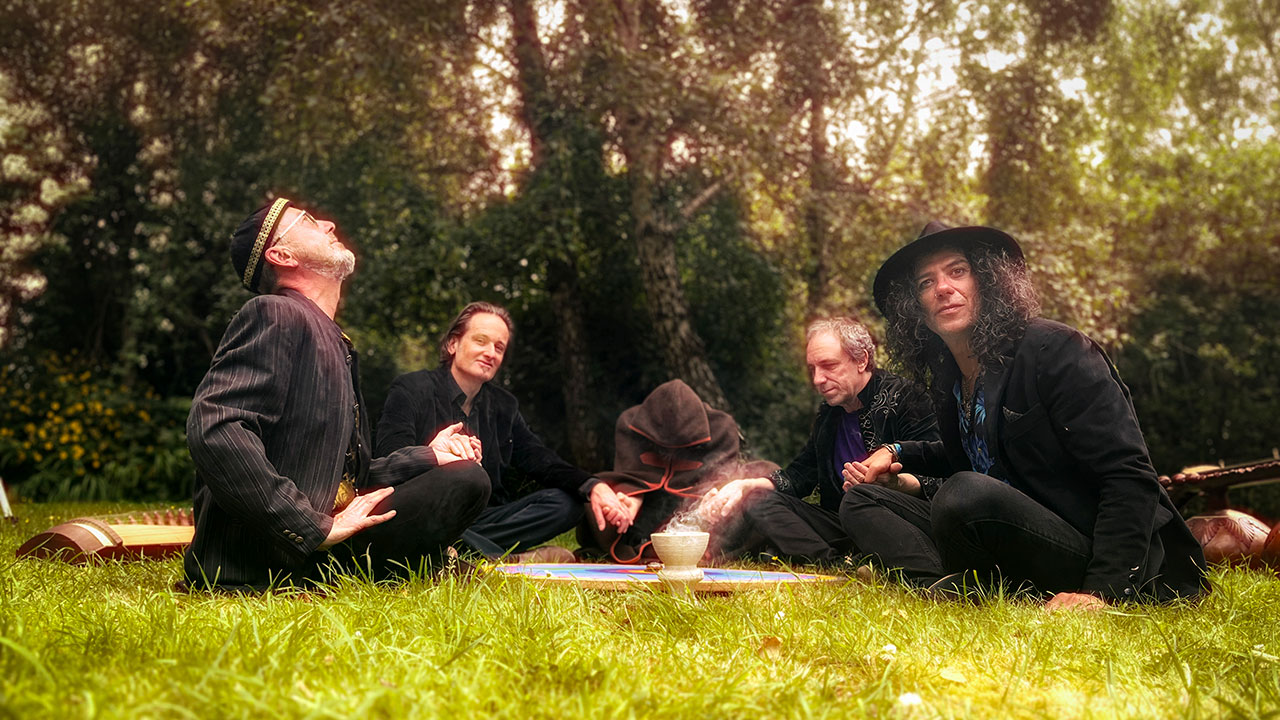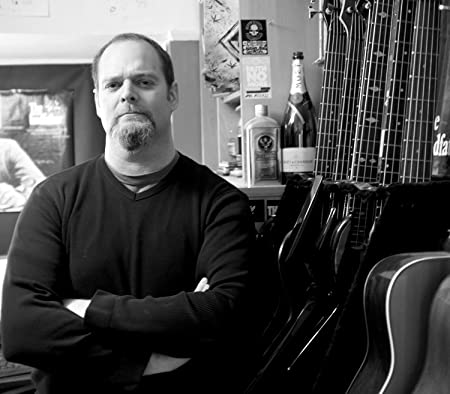“Daevid Allen was always throwing a grenade into situations… Tim Smith was quite benign, although very driven. They both had the same sort of presence:” Kavus Torabi compares his late Gong and Cardiacs bandmates
Briefed to keep Gong going after Allen’s death, the new leader pursues the same aim with a different vision. How have the fans reacted?

“Do I ever feel any pressure? Only if I read comments on the internet!” jokes Kavus Torabi, singer and guitarist with Gong, the psychedelic act and later prog-rock institution founded in 1969 by Daevid Allen.
Before he died – or decoupled from the physical realm, as he would no doubt have put it – Allen tasked Torabi and the band with taking Gong to the next level, wherever in the universe that might be. Of course, not every fan agrees with that decision.
“Every single person who likes Gong, whether that’s old Gong or new Gong, will have their own take on what the band should be,” says Torabi. “I’m the same about the bands that I like, so I get it. At the same time, you have to be confident about what you’re doing, and we are. Fabio Golfetti, our guitarist, has been working with Daevid since the 80s. He’s really grounded and really aware, so if Fabio thinks something is good, I know it’s good.”
Not that the new band have anything to worry about on that score. Since Allen succumbed to cancer eight years ago, Torabi and Golfetti – plus bassist David Sturt, sax/flute player Ian East and drummer Cheb Nettles – have fulfilled their late boss’s wishes with ease. Unending Ascending is the Torabi- fronted band’s fourth album without Allen: even more so than its enjoyably surreal predecessors, it pays deft homage to the original Gong sound.
Anyone familiar with the beautifully warped Radio Gnome Invisible Trilogy albums from Allen’s imperial period – Flying Teapot (1973), Angel’s Egg (also ’73) and You (1974) – will hear echoes from that far-off era in the new songs. Sure, the insane humour of those early LPs has been toned down, and the new sound is pristinely digital as opposed to organic and analogue, but otherwise it’s pretty much Gong as we used to know it. How did they pull it off?
Torabi – whose former membership of the much-missed Cardiacs makes him no stranger to unhinged music – explains: “The first thing is that we have to not think about that too much. We’ve all met fanboy characters who get very obsessive about every single Gong track and say, ‘Why don’t you do this?’ If any of us were like that, we’d find it a little bit overwhelming and a lot of pressure. So because we’re not like that, we’ve got the confidence to do things the way we feel they should be done.
“The other thing is that Unending Ascending is the second of a loose trilogy of albums, joined by three key themes. The universe is one of them, the moon is another, and water is the third. We didn’t realise that the last album [The Universe Also Collapses, 2019] was going to be the first instalment of a trilogy, but as we were making the new one and its themes emerged, we thought, ‘This feels like it’s carrying on from the last album.’ Because of that, we’re now starting to make plans for what the third album will be like.”
Sign up below to get the latest from Prog, plus exclusive special offers, direct to your inbox!
Dig into Unending Ascending and you’re in for quite a journey. All Clocks Reset, the album’s second single, nods directly to the jazzier elements of Angel’s Egg, while its predecessor, Tiny Galaxies, resembles a sinister, music-hall relic. Put the big headphones on and sit back for Ship Of Ishtar, nearly nine minutes of widescreen choral ambience. It’s the beating heart of this compelling album, and raises the question: how much does the new band look to the future, and how much does it look back to Gong’s golden age?
When Daevid asked me to join the band, I thought, ‘This guy is older than my dad, but he’s so in the moment and so aware
“God, this sounds pretentious,” Torabi chuckles, “but hey, this is prog rock, right? Gong was a vehicle for Daevid’s mystical visions: this band has always been about that. Now it’s a platform for me to talk about my visions of eternity, and my metaphysical ideas beyond the physical realm. Not that Gong is about me – with my own songs, and with my other band Knifeworld, there’s a bit more navel-gazing and a bit more about my own life – you can’t do that in Gong: you’ve got to dissolve any egos.”
It’s important to understand that the new Gong are a different beast to the old one, despite the sonic similarities. It’s important because that’s what Allen wanted – for them to move forward, not stagnate into nostalgia. He and Torabi were, it turns out, not particularly similar as people, as the latter explains.
“I’ve never enjoyed confrontation, but Daevid liked to shake things up. He was always throwing a grenade into situations. He did that all the way through Gong because he didn’t like things to stay the same. I don’t want to say that he thrived on confrontation, exactly, but he liked fucking things up a bit. When he asked me to join the band, I thought, ‘This guy is older than my dad, but he’s so in the moment and so aware.’”
The first aim of the project of living is to make peace with mortality, because we’re all going there
He then draws an unexpected, but welcome, comparison. “Daevid was extremely inspiring: very funny and very astute, with a sharp mind. He wasn’t ostentatious, but you’d know if he was in the room because he had an extraordinary energy about him. You know, he reminded me a lot of Tim Smith of Cardiacs.”
If you’re struggling to connect the lysergic fantasies of Gong with the sharp-edged art-rock of Cardiacs (no longer active since the premature demise of leader Smith in 2020), don’t worry. Torabi is convincing on this point, though, explaining: “Believe it or not, Tim was a huge fan of Daevid’s. They both had the same sort of presence. The big difference between them was that Tim was quite benign, although he was very driven: he would never rock the apple cart.”
How have Torabi and his band moved Gong away from their old sound, given that they have an embedded fanbase to please? “There’s a couple of answers,” says the singer. “The first is that when I joined Gong, some decisions had to be made. I was already in my early 40s when I joined, and I’d already done Cardiacs, which was my favourite band of all time, so I didn’t feel too overwhelmed – but it wasn’t easy.
“One of Daevid’s core ideas was the Radio Gnome vision of Zero The Hero And The Witch’s Spell and The Pot Head Pixies and that whole mythology. Now, that was his vision – but it’s not mine, and it would feel bogus to take that story and make our version of it, because that was very much the vision that Daevid had.
There’s no such thing as coincidences. Even when it came to Gong – the band I was listening to while tripping as a teenager, then being asked to join – It all makes sense
“The other answer is that I’m pretty good with humour in real life, but I can’t do humour in music very well. I know humour was a big part of Gong before, and it’s not that we’ve sacrificed that part of it, or that what we’re doing is totally po-faced. I just don’t have that kind of ability for wordplay that Daevid had: he was brilliant at that.
“Still, hopefully I’m able to write lyrics that are romantic and poetic and fantastical. Some people have said, ‘The music’s too serious now.’ But I can’t do funny music: again, it would be inauthentic if I did.”
Talking of authenticity, how does Torabi prepare his mind for composing songs as left-field as these? Gong’s music may sometimes be whimsical, and it’s often beautiful, but it’s always real, which means that it takes effort. “I’ve had the kind of mystical experiences on psychedelics that religions get formed on,” he explains.
“I always used to be really self-conscious and I would never have talked about this stuff publicly before, so I’d always be quite vague when questioned about it; but Gong has enabled me to be much more upfront about my – and I use this phrase advisedly – spiritual beliefs.”
And what is the doorway to this awareness – our old friend, acid? “Sure, but I’ve always gone in with intent: I’ve never said, ‘Let’s bang down a few beers and do a tab.’ It’s always been about fasting for the day, cleansing the house and going in with intent. That’s been a big thing for me. Also, I wouldn’t go as far as to say that psychedelics are the only game in town, because as I understand it transcendental meditation will allow you to access the very nub of things too. The important thing is that I’ve always used psychedelics respectfully.”
That brings us to the deeper mission, and indeed the deeper meaning, of Gong – not just a band that make songs, or not as Torabi sees it, anyway. It’s about a profound understanding of the human condition. “Music has a supernatural quality to it which seems to be beyond the material realm: it’s more important than that,” he says.
“It has a lot to do with something that is a lot higher than us. For me, the first aim of the project of living is to make peace with mortality, because we’re all going there. Ultimately that ties in with music, which has always been an obsession for me, going back as far back as I’ve been conscious. I tried to put everything together – psychedelics, music, dreams – and then I started reading mystical texts, which started describing exactly what I’d experienced.
“It turns out that there’s no such thing as coincidences, because everything is synchronicity. It’s about letting yourself be in a flow state and letting things that feel right come in. Even when it came to Gong – the band I was listening to while tripping as a teenager and thinking, ‘These riffs are really great!’ and then being asked to join – It all makes sense.”
Maybe there is something at work on another plane here. How else do you explain the fact that Gong’s audience is just as progressive as the band? You won’t find many fans complaining about the new line-up’s live performances – a rarity for a group with this much heritage behind them.
“There’s a very forward-thinking mood in the band, and we’ve noticed it in the audiences too,” confirms Torabi. “As the years have passed, our setlists have moved from, say, 50 per cent old songs, to 30 per cent old songs, and that genuinely hasn’t been a deliberate move on our part. After a festival recently, one or two people said, ‘That was a bit brave, not doing any old songs.’ But we hadn’t even considered it – and the set went down really well.”
Torabi still loves the classics, though. “We always used to do Master Builder: it has the greatest riff ever and was the bridge between old and new Gong. And we often do You Can’t Kill Me because it has a long improvised section in the middle – and also because the title very much sums up what Gong is all about. Clearly, we can’t be killed.”
Wherever Daevid Allen is now, we bet he’s smiling. Mission accomplished.
Joel McIver is a British author. The best-known of his 25 books to date is the bestselling Justice For All: The Truth About Metallica, first published in 2004 and appearing in nine languages since then. McIver's other works include biographies of Black Sabbath, Slayer, Ice Cube and Queens Of The Stone Age. His writing also appears in newspapers and magazines such as The Guardian, Metal Hammer, Classic Rock and Rolling Stone, and he is a regular guest on music-related BBC and commercial radio.

